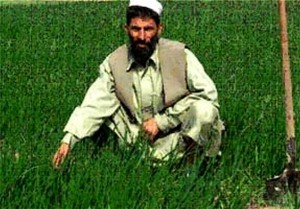
“I did not have peace of mind farming poppies,” says Almas-ullah.
USAID/Afghanistan
USAID-funded loans helped an Afghan farmer begin growing legal crops
30 DECEMBER 2008 | NANGARHAR PROVINCE, AFGHANISTAN
Mr. Almas-ullah, a 41-year old farmer in eastern Afghanistan, has been farming poppies since his childhood. Unhappy with growing the illegal crop, he decided he wanted to earn a legitimate living. “Poppy farming did not significantly improve our lives. I didn’t have peace of mind and always felt guilty,” said Almas-ullah.
Although poppy cultivation is prohibited by Islam and illegal in Afghanistan, poppies requires less maintenance, are drought-resistant, and often very profitable for Afghan farmers. In addition, opium traffickers and drug lords often supply free seeds and fertilizer to harvest poppy. Even though Mr. Almas-ullah wanted to give up farming the illegal crop, he did not have access to financial means to make the switch. And then, one day, a cousin told him about the USAID-funded Islamic Investment and Finance Cooperative (IIFC).
An IIFC is a community development organization that is owned and governed by local community members. These members purchase shares and are paid part of the IIFC profit. All members can take advantage of the many financial services offered by their cooperative.
After Mr. Almas-ullah joined the IIFC, he received his first 35,000 Afghani (US $700) loan. With the money, he purchased new seeds and fertilizer and rented a tractor. Today, he harvests legal crops and vegetables. Instead of one crop, he has many. While his wheat grows, he harvests and sells his onions, providing a steady income for his family through the different seasons.
Mr. Almas-ullah is one of the 21,000 IIFC members supported by USAID in the country’s poppy-rich regions. Through activities such as these, USAID has provided US $65 million in loans to over 70,000 borrows like Mr. Almas-ullah across Afghanistan. Supporting Afghanistan’s legal livelihoods helps reduce corruption and creates a stronger and more sustainable country.







Comment
Make a general inquiry or suggest an improvement.